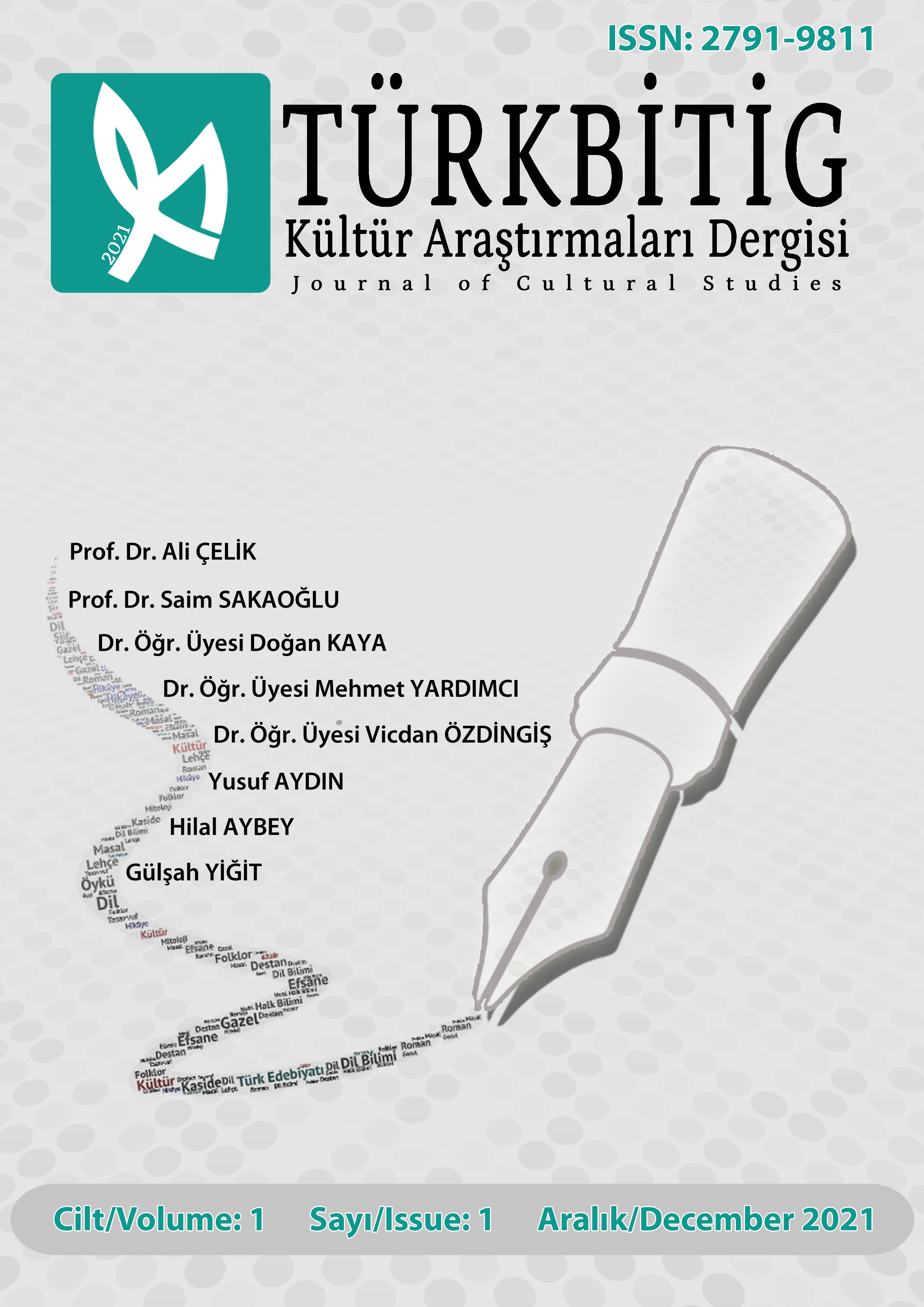Author :
Abstract
İnsanlara yol göstermek, öğüt vermek maksadıyla yazılan manzum veya mensur eserlere nasihatname ya da pendname denir. Sünbül-zâde Vehbî, oğluna öğüt vermek için “Lutfiyye-i Vehbî”yi kaleme almıştır, Eser mesnevi nazım şekliyle yazılmış bir nasihat-nâmedir. İnsanlara yol göstermek, öğüt vermek maksadıyla yazılan manzum veya mensur eserlere nasihat-nâme (pend-nâme) denir. Sünbül-zâde Vehbî, oğlu Lutfullah’ın “güzel huylara sahip olarak büyümesi ve yüce rütbelere erişmesi”ne yardımcı olması düşüncesiyle Nâbî’nin Hayriyye’sini örnek alarak Lutfiyye-i Vehbî’yi kaleme almıştır. Vehbî, eserini oğlu için yazdığını belirtse de, bütün gençler için yazmıştır. Vehbî, eserinde toplumsal kural ve ahlâkî değerlerin hepsine değinmiş, çeşitli ilimlere dair bilgilerden sonra, diğer konuları belli bir düzene göre sıralamıştır.
Çalışmada, öncelikle şairin edebî kişiliği kısaca değerlendirilmiştir. Ardından Lutfullah için kaleme alınan Lutfiyye’deki ilim, ilmin faydaları, hocaya saygı, ilim konusunun öncelikleri ve çeşitli ilim dalları hakkındaki düşünceleriyle Lutfullah’ın öğrenmesini istediği faydalı ilimler veya istemediği batıl ilimler hakkındaki düşünceleri ele alınmıştır. Ayrıca sosyal hayatın hemen her konusuna temas eden şairin, hayat tecrübelerine de yer verilerek, beyitlerle ilim konusu değerlendirilmiştir.
Keywords
Abstract
Poetic or prosaic works written so as to guide, and give advice to people are called nasihat-name, or pend-name. Sunbul-zade Vehbi wrote “Lutfiyye-i Vehbi” out to give advice to his son. The work is an advice-book written in mathnawi verse. Poetic, or prosaic works written on the purpose of guiding, and giving advice to people are called nasihat-name (pend-name). Sunbul-zâde Vehbî wrote Lutfiyye-i Vehbî by taking Hayriyye by Nabi as an example, with the thought of helping his son Lutfullah to grow up with good habits and reach supreme ranks. Although Vehbi states that he wrote his work to his son, he wrote it for all young people. In his work, Vehbi mentioned all of the social rules, and moral values, after the information on various sciences, he listed other subjects in a certain order.
In study, first the poet’s literary personality, was evaluated briefly. Then his thoughts on beneficial knowledge that he wanted Lutfullah to learn or superstitious knowledges that he did not want are discussed with his thoughts on knowledge, benefits of knowledge, respect for the teacher, priorities of the subject of knowledge and various branches of knowledge in Lutfiyye, which he wrote for Lutfullah. In addition, the subject of knowledge was evaluated with beits by including the life experiences of the poet, who touched almost every subject of social life.
Keywords
- AYVERDİ, İlhan (2005). Misalli Büyük Türkçe Sözlük, C. I-II-III: İstanbul: Kubbealtı Neşriyat.
- BEYZÂDEOĞLU, Süreyya Ali (1994). Sümbülzâde Vehbî- Lutfiyye, İstanbul: Bedir Yayınevi.
- BİLGİN, Abdullah Azmi (2003), “Lutfiyye”, Diyanet İslam Ansiklopedisi, C. 27, Ankara: Türkiye Diyanet Vakfı Yay., ss. 236-237.
- ÇAVUŞOĞLU, Ali (2004), Kıyafetnameler, Ankara: Akçağ Yayınları.
- ÇELEBİ, İlyas (2012). “Tılsım”, Diyanet İslam Ansiklopedisi, C. 41, İstanbul: Türkiye Diyanet Vakfı Yay., ss. 91-94.
- ÇİÇEKLER, Mustafa (2004), “Mesnevi”, Diyanet İslam Ansiklopedisi, C. 29, Ankara: Türkiye Diyanet Vakfı Yay., ss. 320-322.
- DEVELLİOĞLU, Ferit (2010). Osmanlıca Türkçe Ansiklopedik Lügat, Ankara: Aydın Kitabevi.
- DİLÇİN, Cem (2009), Örneklerle Türk Şiir Bilgisi, Ankara: Türk Dil Kurumu Yayınları.
- İSEN, Mustafa, Osman HORATA vd. (2006). Eski Türk Edebiyatı El Kitabı, Ankara: Grafiker Yayınları.
- KALKAN, Asiye Figen (2012), Lutfiyye ve Hayriyye Çerçevesinde Divan Edebiyatında Çocuk Eğitimi, Yayınlanmamış Yüksek Lisans Tezi, Konya: Necmettin Erbakan Üniversitesi Eğitim Bilimler Enstitüsü.
- KARTAL, Ahmet ve Ahmet Atilla ŞENTÜRK (2010), Eski Türk Edebiyatı Tarihi, İstanbul: Dergâh Yayınları.
- LEVEND, Agâh Sırrı (1984), Divan Edebiyatı Kelimeler ve Remizler Mazmunlar ve Mefhumlar, İstanbul: Enderun Kitabevi.
- MENGİ, Mine (1987), Divan Edebiyatında Hikemi Tarzın Büyük Temsilcisi Nâbî, Ankara: Atatürk Kültür Merkezi Yayını.
- Muallim Naci (1986). Osmanlı Şairleri, hzl. Cemal Kurnaz, Ankara: Kültür ve Turizm Bakanlığı Yayınları.
- ONAY, Ahmet Talat (1992). Eski Türk Edebiyatında Mazmunlar, hzl. Cemal Kurnaz, Ankara: Türkiye Diyanet Vakfı Yayınları.
- PALA, İskender (1989). Ansiklopedik Dîvân Şiiri Sözlüğü, C. I-II Ankara: Akçağ Yayınları.
- PALA, İskender (2006). “Nasihatnâme”, Diyanet İslam Ansiklopedisi, C. 32, İstanbul: Türkiye Diyanet Vakfı Yayınları, ss. 409-410.
- SARIOĞLU ÇEVİK, Atiye (2019). XVIII. Yüzyıl Nasihatnâmelerinde Levh-Nâme ve Lutfiyye’nin Karşılaştırılması, Yayınlanmamış Yüksek Lisans Tezi, Uşak: Uşak Üniversitesi Sosyal Bilimler Enstitüsü.
- YILMAZ, Mehmet (1992), Edebiyatımızda İslamî Kaynaklı Sözler (Ansiklopedik Sözlük),





